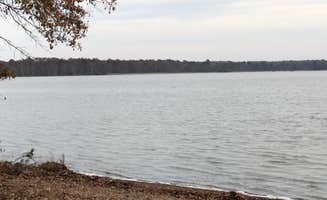Dispersed camping near Morattico, Virginia primarily takes place within Wildlife Management Areas (WMAs) that offer backcountry camping experiences throughout eastern Virginia. These sites sit within the Chesapeake Bay watershed at elevations generally below 100 feet, creating opportunities for waterfront camping along tidal rivers. Winter temperatures typically range from 30-50°F while summer months can reach 85-95°F with high humidity, making spring and fall the most comfortable camping seasons.
What to do
Fishing opportunities: At Eagle Nest Lookout, campers can fish directly from shoreline sites. "If you are fishing, they pulled up a 17 pounder and a 25 pounder using a drone to take their lure easy out and someone caught a decent bass," notes Kevin F., highlighting the productive fishing grounds.
Wildlife observation: The 5,217-acre forested coastal plains at Chickahominy WMA provide excellent bird and wildlife viewing. Morning hours offer the best chance to spot native wildlife. "There is a raised area—about 20 feet above the drivable area—that would be perfect for a campfire and a tent or two," mentions Kurt S., describing an elevated vantage point.
Hiking exploration: Ware Creek Wildlife Management Area offers unmarked hiking trails through coastal forest. "Will explore the area in the morning," writes Garrett G., who recommends taking advantage of the natural terrain for day hikes.
What campers like
Waterfront access: Many sites at Chickahominy Wildlife Management Area offer direct water access. "Basic parking spot in quite location... It's 2 parking side by water and some other ones on the way while driving," reports GoGo, describing the proximity to shoreline.
Multiple camping options: Eagle Nest Lookout provides different camping experiences based on terrain. Kevin F. explains, "Car camped here 5 feet from the water. There is a large shoreline area to car camp and right up the hill is a nice tent site as well overlooking the river."
Affordability: The daily use fee structure makes these areas budget-friendly. GoGo notes, "You can purchase $4 daily pass or if Virginia residents free 14 days camping complementary as well with any fishing license or hunting license if you have."
What you should know
Limited privacy: Campsites often serve multiple recreational purposes. "If your looking for complete privacy, I'd recommend trying one of the other sites sprinkled around the area. Definitely a busy little spot but we ended up having the place to ourselves once all the people fishing left," advises Kevin F.
Noise considerations: Some areas experience significant noise from nearby facilities. "Be aware that you will be able to hear the shooting range up till the evening. In my opinion these areas are not necessarily the best place for quiet secluded camping," warns Greg S.
Trash management: Visitors should be prepared to clean up after others. "There was quite a bit of trash dispersed in this area in which we picked up," reports Greg S., suggesting campers bring extra garbage bags for site maintenance.
Tips for camping with families
Best locations: The elevated knoll at Eagle Nest Lookout provides safer camping for families with small children compared to waterfront sites. "At the top is an area about 20 feet wide covered in mature trees with a view of the James River. You are able to park down below and carry your gear the short distance," explains N I.
Weekend planning: Arrive early on weekends to secure preferred spots, as fishing traffic increases significantly. "This is used by fisherman shore fishing," notes Kevin F., suggesting mid-week visits for a quieter experience.
Safety preparation: No cell service exists in many areas, requiring advance safety planning. Campers should bring physical maps, first aid supplies, and enough water for all family members.
Tips from RVers
Trailer accessibility: Small trailers under 20 feet can access certain waterfront sites. Kurt S. reports, "I arrived with a small (18') trailer and put it within 5' of the water. Since it's a WMA you can set up anywhere but this place has about 15 cleared areas."
Parking limitations: RV spaces are limited to established clearings with no designated pads or hookups. Bring leveling blocks and park only in previously used areas to minimize environmental impact.
Generator restrictions: Noise rules apply to generator use in these primitive areas. One camper noted extended generator use as a significant disturbance: "This group ran their generators up until 4:30 am. Very uncool and inconsiderate."


